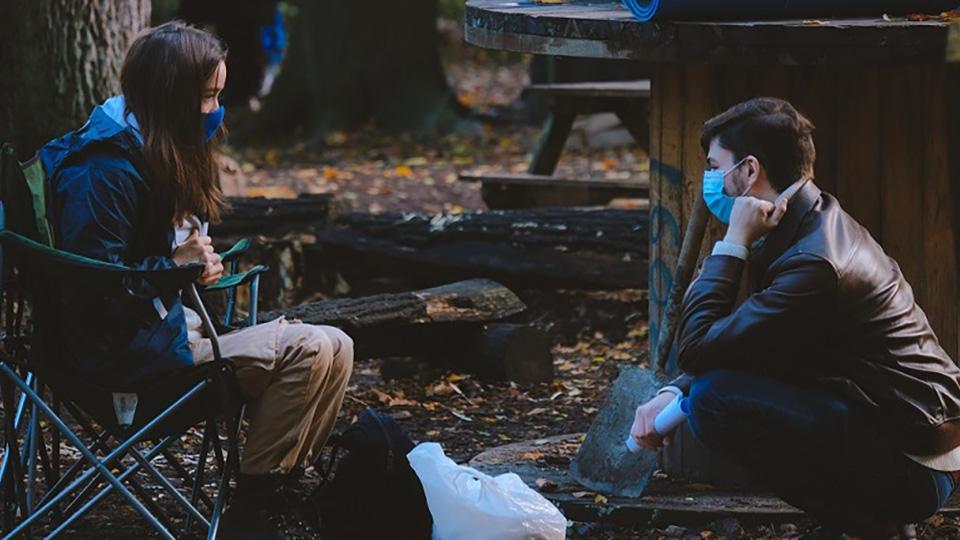Guide for Covid-safe filmmaking shaped by Goldsmiths academic
Primary page content
A Goldsmiths academic is among a group of education professionals, screen industry practitioners, lawyers and scientists to shape new Covid-safe filmmaking guidelines for students.

Students Amelia Belam and Tancredi Lo Cascio on Goldsmiths’ MA Filmmaking programme, on location rehearsing for graduation film Without You, which was filmed using the new Covid-19 Guidelines for HE and FE productions
Tracy Bass, Senior Lecturer and convenor of the MA Filmmaking (Producing) at Goldsmiths, is among lead authors of a new set of guidance launched last month for students to manage the risk of working on a film, TV or other visual media production during the pandemic.
The guidelines build on ScreenSkills Covid-awareness training offered since June as well as Covid-safe guidance produced by various screen industry organisations for practitioners working during the pandemic. They are intended for university and college students on screen-related courses, and for academics and support staff to observe safe practice when planning and undertaking work.
The project was initiated by Middlesex University Senior Lecturer Eddie McCaffrey, who was inspired to put together the guidelines when he saw the steps professionals were taking to adapt to Covid and realised there was a need to do something for students.
The guidelines were published by ScreenSkills, a non-profit organisation which works with screen industries to develop opportunities for people from under-represented groups and diverse backgrounds. The collaboration includes academics at Middlesex, Goldsmiths, Bournemouth, Ulster and Edinburgh Napier with additional input from other educators, lawyers and scientists.
The guidelines have also been reviewed and endorsed by TV and film industry organisations such as the British Film Commission, Pact and UK Screen Alliance.
Chapters cover every aspect of filmmaking - camerawork, directing lighting, post-production, hair and make-up and costume - different genres and formats, and how to cast and rehearse actors in social distancing conditions. They also address personal hygiene and maintaining good mental health.
Goldsmiths MA Filmmaking student Harriet Still recently co-produced a mockumentary, What's In A Name, about a vicar called Hugh Hefner and his wife. While finding it daunting at first, she said: “After reading the guidelines and consulting with our crew and tutors, we were able to create a safe environment for our cast and crew, as well as using a lot of common sense. We delegated to each of the Heads of Department to ensure their own crew was safe. That way there were always multiple sets of eyes ensuring that it was a COVID-safe set.”
Those behind the project intend to get the guidelines to every university and FE college across the UK, and say they can be used as they are or varied and incorporated into each institution’s own regulations.
Producer Leni Jaegar, who studied MA Filmmaking at Goldsmiths and also worked on What’s In A Name said: “Among other things during lockdown everyone’s longing for new content was noticeable, and the importance of fictional as well as factual filmmaking was obvious to me as never before.”